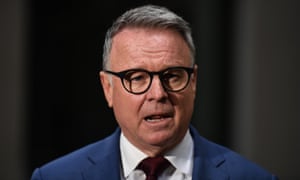Extract from The Guardian
Senior Labor frontbencher Tanya Plibersek said issue should not be discussed during Covid crisis and people need to ‘get their priorities straight’
Labor’s Senate leader, Penny Wong, has said the ALP wins elections when leaders convince voters they are “champions of progress and trusted custodians of the economy”, in a rebuke to the rightwing frontbencher Joel Fitzgibbon.
Fitzgibbon had suggested Labor could split if it fails to reconcile its progressive and blue-collar constituencies.
But Wong told Guardian Australia: “Our winning leaders did not see conflict between fairness, economic growth and a sustainable future; they knew these values to be mutually dependent.”
She said Labor needed to protect existing jobs “while creating new jobs and taking Australia forward”. Wong on Thursday declared “all of us in Labor” needed to focus on the Morrison government’s “policy vacuum” on climate and energy.
Fitzgibbon’s latest public intervention has angered a number of his shadow cabinet colleagues. After the shadow resources minister floated in a podcast a potential split sometime in the future, Tanya Plibersek, the party’s former deputy leader and the shadow education minister, told Guardian Australia: “It’s beyond me why anyone is talking about this when we have vulnerable people dying in nursing homes.”
“People need to get their priorities straight,” she said.
Fitzgibbon has been at public loggerheads with the shadow minister for climate change and energy Mark Butler over the direction of Labor’s climate policy after the 2019 election defeat, and more recently over taxpayer-supported gas development.
Fitzgibbon, the veteran New South Wales rightwinger, suffered a substantial swing against him at the election in his Hunter Valley coalmining seat, and has made it clear that he thinks Labor has swung too heavily in favouring its progressive inner-city constituency over its traditional blue collar base.
While Fitzgibbon has signed up to Labor’s post-election policy of net zero emissions by 2050, he has argued the emissions reduction target for 2030 should be the same as the Coalition’s.
He has been rebuked for his front-running on policy during the past fortnight by both Butler and the Labor leader Anthony Albanese.
In the new podcast, reported by the Australian, Fitzgibbon says: “I am very fearful about how the Labor party will manage … [to] juggle these two electoral bases and I do fear that, it won’t be in my time, but the party might end up splitting.”
While Fitzgibbon’s arguments have some support internally, his regular incursions have also infuriated other colleagues. Several regional Labor MPs took to social media on Thursday to blast Fitzgibbon for suggesting Labor couldn’t fuse constituencies it has been fusing successfully since the Whitlam era.
Albanese at the weekend used an interview with Guardian Australia to criticise Fitzgibbon for backing taxpayer subsidies for gas development in advance of seeing a concrete proposal from the Morrison government.
On Thursday Albanese said it was entirely possible for Labor to represent the interests of both its constituencies, and he insisted any “modern” political party needed to deal with the risks of climate change.
Albanese said Labor evolved with the times.
“The Labor party has changed over a period of time. There were once people in the Labor party who supported the White Australia policy. It was one of our founding planks. We changed.
“The Labor party used to support absolute protection and not opening up the economy, which the Hawke and Keating governments did. The Labor party, for a long time, like Australian society, didn’t support equality for women, or equality on the basis of people’s sexuality.
“The Labor party is a modern party. Part of what any modern party with any self-respect will be about is dealing with the effects of climate change,” he said.
Albanese said the split Fitzgibbon mused about was something that might happen, not in his lifetime. The Labor leader said he was “concerned about today”.
“I’m concerned about the relatives of the people I’ve met with this morning and aged care. I’m concerned about immediate issues.”
He said Labor’s mid-century position on emissions reduction was now a mainstream view championed by environmentalists, major business groups and farmers. He said this view was held by most of the country: “Everyone except the Liberal and National party who are out of step with mainstream opinion.”
Albanese said Fitzgibbon should remain on the front bench because he was an important member of the team.
The Labor leader is close to both Fitzgibbon and Butler, who are both significant figures in the right and left factions.
Fitzgibbon used an interview on the ABC on Thursday morning to make it clear he remained a supporter of Albanese’s leadership of Labor, but in implicit criticism of Butler, he declared colleagues needed to give Albanese “space” to take Labor back to the political centre.
Fitzgibbon also made it plain he would continue his public campaign.
“Anthony Albanese is showing, in my view, a very strong leadership, taking the party back to the centre ground where I think most Australians want us to be,” Fitzgibbon said.

No comments:
Post a Comment